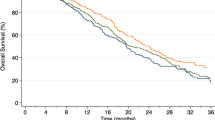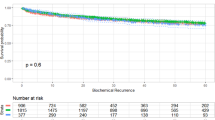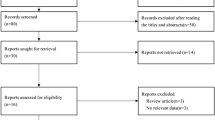Abstract
Background
The association of obesity with biochemical recurrence (BCR) after treatment of clinically localised prostate cancer (PC) shows inconsistent results. Our aim was to systematically review all evidence evaluating obesity as a prognostic factor for BCR.
Methods
We searched PubMed, Web of Science and Scopus, from inception to June 1, 2021. Cohort studies reporting BCR among PC patients stratified by body mass index (BMI) were included. To assess the quality of the selected studies, we used the Newcastle–Ottawa scale (NOS). Risk of BCR among obese patients (BMI ≥ 30 kg/m2) was compared with normal weight (BMI < 25), pooling individual hazard ratios (HR) in random-effect meta-analysis. Associations for continuous BMI per 5 kg/m2 were also calculated. Subgroup analyses were conducted to assess reasons for heterogeneity and causal criteria were formally evaluated.
Results
We identified 46 cohort studies including 86,490 PC patients. A total of 14,719 (17.1%) patients developed BCR. There was no consistent definition of BCR. Obesity was associated with BCR (HR: 1.25, 95% CI: 1.11–1.39, I2: 70.3%), and there was a 10% increase (95% CI: 4–15%, I2: 66.3%) in BCR per 5 kg/m2 increase in BMI. The heterogeneity was high but decreased in the subgroup of highest-quality NOS score and when the BMI was measured by the researchers (I2: 0.0%). The association was consistent in patients receiving radical prostatectomy but not in patients receiving other therapies.
Conclusions
Obesity showed a moderate, consistent relationship with biochemical recurrence after radical prostatectomy. Measurement of BMI and BCR was variable, highlighting the need for standardised clinical guidelines. Preventive weight control programs may have a role in reducing BCR for clinically localised PC patients.
This is a preview of subscription content, access via your institution
Access options
Subscribe to this journal
Receive 4 print issues and online access
$259.00 per year
only $64.75 per issue
Buy this article
- Purchase on Springer Link
- Instant access to full article PDF
Prices may be subject to local taxes which are calculated during checkout



Similar content being viewed by others
Code availability
Code will be made available for bona fide researchers on request.
References
Mattiuzzi C, Lippi G. Current cancer epidemiology. J Epidemiol Glob Health. 2019;9:217–22.
Fleshner K, Carlsson SV, Roobol MJ. The effect of the USPSTF PSA screening recommendation on prostate cancer incidence patterns in the USA. Nat Rev Urol. 2017;14:26–37.
Wilt TJ, Vo TN, Langsetmo L, Dahm P, Wheeler T, Aronson WJ, et al. Radical prostatectomy or observation for clinically localized prostate cancer: extended follow-up of the prostate cancer intervention versus observation trial (PIVOT). Eur Urol. 2020;77:713–24.
Cornford P, van den Bergh RCN, Briers E, Van den Broeck T, Cumberbatch MG, De Santis M, et al. EAU-EANM-ESTRO-ESUR-SIOG Guidelines on Prostate Cancer. Part II-2020 Update: Treatment of Relapsing and Metastatic Prostate Cancer. Eur Urol. 2021;79:263–82.
Panuganti KK, Nguyen M, Kshirsagar RK Obesity. 2021. In: StatPearls [Internet]. Treasure Island (FL): StatPearls Publishing; 2021.
Rivera-Izquierdo M, Pérez de Rojas J, Martínez-Ruiz V, Pérez-Gómez B, Sánchez MJ, Khan KS, et al. Obesity as a risk factor for prostate cancer mortality: a systematic review and dose-response meta-analysis of 280,199 patients. Cancers (Basel). 2021;13:4169.
Cao Y, Ma J. Body mass index, prostate cancer-specific mortality, and biochemical recurrence: a systematic review and meta-analysis. Cancer Prev Res (Philos). 2011;4:486–501.
Hu MB, Xu H, Bai PD, Jiang HW, Ding Q. Obesity has multifaceted impact on biochemical recurrence of prostate cancer: a dose-response meta-analysis of 36,927 patients. Med Oncol. 2014;31:829.
Bai PD, Hu MB, Xu H, Zhu WH, Hu JM, Yang T, et al. Body mass index is associated with higher Gleason score and biochemical recurrence risk following radical prostatectomy in Chinese men: a retrospective cohort study and meta-analysis. World J Surg Oncol. 2015;13:311.
Luo R, Chen Y, Ran K, Jiang Q. Effect of obesity on the prognosis and recurrence of prostate cancer after radical prostatectomy: a meta-analysis. Transl Androl Urol. 2020;9:2713–22.
Shea BJ, Reeves BC, Wells G, Thuku M, Hamel C, Moran J, et al. AMSTAR 2: a critical appraisal tool for systematic reviews that include randomised or non-randomised studies of healthcare interventions, or both. BMJ 2017;358:j4008.
Page MJ, McKenzie JE, Bossuyt PM, Boutron I, Hoffmann TC, Mulrow CD, et al. The PRISMA 2020 statement: an updated guideline for reporting systematic reviews. BMJ. 2021;372:n71.
Wells GA, Shea B, O’Connell D, Peterson J, Welch V, Losos M, et al. The Newcastle-Ottawa Scale (NOS) for assessing the quality of nonrandomised studies in meta-analyses. https://www.ohri.ca/programs/clinical_epidemiology/oxford.asp.
World Health Organization. Body mass index. https://www.who.int/data/gho/data/themes/theme-details/GHO/body-mass-index-(bmi).
Riley RD, Moons KGM, Snell KIE, Ensor J, Hooft L, Altman DG, et al. A guide to systematic review and meta-analysis of prognostic factor studies. BMJ. 2019;364:k4597.
Riley RD, Higgins JP, Deeks JJ. Interpretation of random effects metaanalyses. BMJ 2011;342:d549.
Greenland S, Longnecker MP. Methods for trend estimation from summarized dose-response data, with applications to meta-analysis. Am J Epidemiol. 1992;135:1301–9.
Centre for Evidence-Based Medicine. Levels of Evidence. https://www.cebm.ox.ac.uk/resources/levels-of-evidence
Hill AB. The environment and disease: Association or causation? Proc R Soc Med. 1965;58:295–300.
Debray TPA, Moons KGM, Riley RD. Detecting small-study effects and funnel plot asymmetry in meta-analysis of survival data: A comparison of new and existing tests. Res Synth Methods 2018;9:41–50.
Egger M, Davey Smith G, Schneider M, Minder C. Bias in meta-analysis detected by a simple, graphical test. BMJ 1997;315:629–34.
Vidal AC, Oyekunle T, Howard LE, De Hoedt AM, Kane CJ, Terris MK, et al. Obesity, race, and long-term prostate cancer outcomes. Cancer 2020;126:3733–41.
Leal-García M, Canto P, Cárdenas-Cárdenas E, Feria-Bernal G, García-García E, Méndez JP. Overweight and obesity in men with prostate cancer do not constitute risk factors for biochemical recurrence. Aging Male. 2020;23:1283–8.
Langlais CS, Cowan JE, Neuhaus J, Kenfield SA, Van Blarigan EL, Broering JM, et al. Obesity at diagnosis and prostate cancer prognosis and recurrence risk following primary treatment by radical prostatectomy. Cancer Epidemiol Biomark Prev. 2019;28:1917–25.
Khan S, Hicks V, Colditz GA, Kibel AS, Drake BF. The association of weight change in young adulthood and smoking status with risk of prostate cancer recurrence. Int J Cancer. 2018;142:2011–8.
Wissing M, Chevalier S, McKercher G, Laprise C, Aprikian S, O’Flaherty A, et al. The relationship between body-mass index, physical activity, and pathologic and clinical outcomes after radical prostatectomy for prostate cancer. World J Urol. 2019;37:789–98.
Yu YD, Byun SS, Lee SE, Hong SK. Impact of body mass index on oncological outcomes of prostate cancer patients after radical prostatectomy. Sci Rep. 2018;8:11962.
Cullen J, Young D, Chen Y, Degon M, Farrell J, Sedarsky J, et al. Predicting prostate cancer progression as a function of ets-related gene status, race, and obesity in a longitudinal patient cohort. Eur Urol Focus. 2018;4:818–24.
Shiota M, Takeuchi A, Sugimoto M, Kashiwagi E, Dejima T, Kiyoshima K, et al. The differential impact of body mass index and the feature of metabolic syndrome on oncological outcomes following different surgical procedures in japanese men with prostate cancer. Ann Surg Oncol. 2017;24:1443–50.
Zhao R, Cheng G, Wang B. BMI and serum lipid parameters predict increasing risk and aggressive prostate cancer in Chinese people. Oncotarget. 2017;8:66051–60.
Dickerman BA, Torfadottir JE, Valdimarsdottir UA, Giovannucci E, Wilson KM, Aspelund T, et al. Body fat distribution on computed tomography imaging and prostate cancer risk and mortality in the AGES-Reykjavik study. Cancer. 2019;125:2877–85.
Roux V, Eyraud R, Brureau L, Gourtaud G, Senechal C, Fofana M, et al. Impact du score de Gleason sur la survie sans récidive biologique après prostatectomie totale pour cancer avec marges chirurgicales positives [Impact of Gleason score on biochemical recurrence free survival after radical prostatectomy with positive surgical margins]. Prog Urol. 2017;27:467–73.
Maj-Hes AB, Mathieu R, Özsoy M, Soria F, Moschini M, Abufaraj M, et al. Obesity is associated with biochemical recurrence after radical prostatectomy: A multi-institutional extended validation study. Urol Oncol. 2017;35:460.
Schiffmann J, Salomon G, Tilki D, Budäus L, Karakiewicz PI, Leyh-Bannurah SR, et al. Radical prostatectomy neutralizes obesity-driven risk of prostate cancer progression. Urol Oncol. 2017;35:243–9.
Goto K, Nagamatsu H, Teishima J, Kohada Y, Fujii S, Kurimura Y, et al. Body mass index as a classifier to predict biochemical recurrence after radical prostatectomy in patients with lower prostate-specific antigen levels. Mol Clin Oncol. 2017;6:748–52.
Yamoah K, Zeigler-Johnson CM, Jeffers A, Malkowicz B, Spangler E, Park JY, et al. The impact of body mass index on treatment outcomes for patients with low-intermediate risk prostate cancer. BMC Cancer. 2016;16:557.
Ohwaki K, Endo F, Hattori K. Abdominal obesity, hypertension, antihypertensive medication use and biochemical recurrence of prostate cancer after radical prostatectomy. Eur J Cancer. 2015;51:604–9.
Wang LS, Murphy CT, Ruth K, Zaorsky NG, Smaldone MC, Sobczak ML, et al. Impact of obesity on outcomes after definitive dose-escalated intensity-modulated radiotherapy for localized prostate cancer. Cancer. 2015;121:3010–7.
Tanimoto R, Fashola Y, Scotland KB, Calvaresi AE, Gomella LG, Trabulsi EJ, et al. Risk factors for biochemical recurrence after robotic assisted radical prostatectomy: a single surgeon experience. BMC Urol. 2015;15:27.
Agalliu I, Williams S, Adler B, Androga L, Siev M, Lin J, et al. The impact of obesity on prostate cancer recurrence observed after exclusion of diabetics. Cancer Causes Control. 2015;26:821–30.
Koo KC, Yoon YE, Rha KH, Chung BH, Yang SC, Hong SJ. Low body mass index is associated with adverse oncological outcomes following radical prostatectomy in Korean prostate cancer patients. Int Urol Nephrol. 2014;46:1935–40.
Hayashi N, Matsushima M, Kido M, Naruoka T, Furuta A, Furuta N, et al. BMI is associated with larger index tumors and worse outcome after radical prostatectomy. Prostate Cancer Prostatic Dis. 2014;17:233–7.
Chalfin HJ, Lee SB, Jeong BC, Freedland SJ, Alai H, Feng Z, et al. Obesity and long-term survival after radical prostatectomy. J Urol. 2014;192:1100–4.
Narita S, Mitsuzuka K, Yoneyama T, Tsuchiya N, Koie T, Kakoi N, et al. Impact of body mass index on clinicopathological outcome and biochemical recurrence after radical prostatectomy. Prostate Cancer Prostatic Dis. 2013;16:271–6.
Tomaszewski JJ, Chen YF, Bertolet M, Ristau BT, Woldemichael E, Nelson JB. Obesity is not associated with aggressive pathologic features or biochemical recurrence after radical prostatectomy. Urology. 2013;81:992–6.
Asmar R, Beebe-Dimmer JL, Korgavkar K, Keele GR, Cooney KA. Hypertension, obesity and prostate cancer biochemical recurrence after radical prostatectomy. Prostate Cancer Prostatic Dis. 2013;16:62–6.
Campeggi A, Xylinas E, Ploussard G, Ouzaid I, Fabre A, Allory Y, et al. Impact of body mass index on perioperative morbidity, oncological, and functional outcomes after extraperitoneal laparoscopic radical prostatectomy. Urology. 2012;80:576–84.
Mucksavage P, Mitchell C, Kutikov A, Wein AJ, Torigian D, Malkowicz SB. Anthropometric differences in obese men with biochemical failure after radical retropubic prostatectomy. Urol Oncol. 2012;30:590–5.
Kok DE, van Roermund JG, Aben KK, van de Luijtgaarden MW, Karthaus HF, van Vierssen Trip OB, et al. Body mass index is not a predictor of biochemical recurrence after radical prostatectomy in Dutch men diagnosed with prostate cancer. World J Urol. 2011;29:695–701.
Joshu CE, Mondul AM, Menke A, Meinhold C, Han M, Humphreys EB, et al. Weight gain is associated with an increased risk of prostate cancer recurrence after prostatectomy in the PSA era. Cancer Prev Res (Philos). 2011;4:544–51.
Geinitz H, Thamm R, Mueller T, Jess K, Zimmermann FB, Molls M, et al. Impact of body mass index on outcomes after conformal radiotherapy in patients with prostate cancer. Int J Radiat Oncol Biol Phys. 2011;81:16–22.
Komaru A, Kamiya N, Suzuki H, Endo T, Takano M, Yano M, et al. Implications of body mass index in Japanese patients with prostate cancer who had undergone radical prostatectomy. Jpn J Clin Oncol. 2010;40:353–9.
van Roermund JG, Hinnen KA, Battermann JJ, Witjes JA, Bosch JL, Kiemeney LA, et al. Body mass index is not a prognostic marker for prostate-specific antigen failure and survival in Dutch men treated with brachytherapy. BJU Int. 2010;105:42–8.
Ly D, Reddy CA, Klein EA, Ciezki JP. Association of body mass index with prostate cancer biochemical failure. J Urol. 2010;183:2193–9.
Sumitomo M, Asakuma J, Yoshii H, Sato A, Horiguchi A, Ito K, et al. Anterior perirectal fat tissue thickness is a strong predictor of recurrence after high-intensity focused ultrasound for prostate cancer. Int J Urol. 2010;17:776–82.
King CR, Spiotto MT, Kapp DS. Obesity and risk of biochemical failure for patients receiving salvage radiotherapy after prostatectomy. Int J Radiat Oncol Biol Phys. 2009;73:1017–22.
Pfitzenmaier J, Pritsch M, Haferkamp A, Jakobi H, Fritsch F, Gilfrich C, et al. Is the body mass index a predictor of adverse outcome in prostate cancer after radical prostatectomy in a mid-European study population? BJU Int. 2009;103:877–82.
van Roermund JG, Kok DE, Wildhagen MF, Kiemeney LA, Struik F, Sloot S, et al. Body mass index as a prognostic marker for biochemical recurrence in Dutch men treated with radical prostatectomy. BJU Int. 2009;104:321–5.
Efstathiou JA, Skowronski RY, Coen JJ, Grocela JA, Hirsch AE, Zietman AL. Body mass index and prostate-specific antigen failure following brachytherapy for localized prostate cancer. Int J Radiat Oncol Biol Phys. 2008;71:1302–8.
Hisasue S, Yanase M, Shindo T, Iwaki H, Fukuta F, Nishida S, et al. Influence of body mass index and total testosterone level on biochemical recurrence following radical prostatectomy. Jpn J Clin Oncol. 2008;38:129–33.
Spangler E, Zeigler-Johnson CM, Coomes M, Malkowicz SB, Wein A, Rebbeck TR. Association of obesity with tumor characteristics and treatment failure of prostate cancer in African-American and European American men. J Urol. 2007;178:1939–45.
Efstathiou JA, Chen MH, Renshaw AA, Loffredo MJ, D’Amico AV. Influence of body mass index on prostate-specific antigen failure after androgen suppression and radiation therapy for localized prostate cancer. Cancer. 2007;109:1493–8.
Stroup SP, Cullen J, Auge BK, L’Esperance JO, Kang SK. Effect of obesity on prostate-specific antigen recurrence after radiation therapy for localized prostate cancer as measured by the 2006 Radiation Therapy Oncology Group-American Society for Therapeutic Radiation and Oncology (RTOG-ASTRO) Phoenix consensus definition. Cancer. 2007;110:1003–9.
Siddiqui SA, Inman BA, Sengupta S, Slezak JM, Bergstralh EJ, Leibovich BC, et al. Obesity and survival after radical prostatectomy: a 10-year prospective cohort study. Cancer. 2006;107:521–9.
Strom SS, Kamat AM, Gruschkus SK, Gu Y, Wen S, Cheung MR, et al. Influence of obesity on biochemical and clinical failure after external-beam radiotherapy for localized prostate cancer. Cancer. 2006;107:631–9.
Strom SS, Wang X, Pettaway CA, Logothetis CJ, Yamamura Y, Do KA, et al. Obesity, weight gain, and risk of biochemical failure among prostate cancer patients following prostatectomy. Clin Cancer Res. 2005;11:6889–94.
WHO Expert Consultation. Appropriate body-mass index for Asian populations and its implications for policy and intervention strategies. Lancet. 2004;363:157–63.
Huedo-Medina TB, Sánchez-Meca J, Marín-Martínez F, Botella J. Assessing heterogeneity in meta-analysis: Q statistic or I2 index? Psychol Methods. 2006;11:193–206.
Khan KS, Ball E, Fox CE, Meads C. Systematic reviews to evaluate causation: an overview of methods and application. Evid Based Med. 2012;17:137–41.
Keith SW, Kwabi-Addo B, Zeigler-Johnson C. Interactions between obesity and one-carbon metabolism genes in predicting prostate cancer outcomes among white and black patients. J Racial Ethn Health Disparities. (2021). https://doi.org/10.1007/s40615-020-00958-6.
Whitley BM, Moreira DM, Thomas JA, Aronson WJ, Terris MK, Presti JC, et al. Preoperative weight change and risk of adverse outcome following radical prostatectomy: results from the Shared Equal Access Regional Cancer Hospital database. Prostate Cancer Prostatic Dis. 2011;14:361–6.
Perez-Cornago A, Appleby PN, Pischon T, Tsilidis KK, Tjønneland A, Olsen A, et al. Tall height and obesity are associated with an increased risk of aggressive prostate cancer: results from the EPIC cohort study. BMC Med. 2017;15:115.
Tan W, Wang L, Ma Q, Qi M, Lu N, Zhang L, et al. Adiponectin as a potential tumor suppressor inhibiting epithelial-to-mesenchymal transition but frequently silenced in prostate cancer by promoter methylation. Prostate. 2015;75:1197–205.
Kim SW, Chun M, Jung YS, Oh YT, Noh OK, Cho O. Impact of body mass index on local recurrence according to intrinsic subtype approximation in korean women with early stage invasive breast cancer receiving contemporary treatments. J Cancer. 2021;12:4648–54.
Scarpa M, Ruffolo C, Erroi F, Fiorot A, Basato S, Pozza A, et al. Obesity is a risk factor for multifocal disease and recurrence after colorectal cancer surgery: a case-control study. Anticancer Res. 2014;34:5735–41.
Han H, Cao Z, Qin Y, Wei X, Ruan Y, Cao Y, et al. Morbid obesity is adversely associated with perioperative outcomes in patients undergoing robot-assisted laparoscopic radical prostatectomy. Can Urol Assoc J. 2020;14:E574–E581.
Muller RL, Gerber L, Moreira DM, Andriole G Jr, Hamilton RJ, Fleshner N, et al. Obesity is associated with increased prostate growth and attenuated prostate volume reduction by dutasteride. Eur Urol. 2013;63:1115–21.
World Cancer Research Fund. American Institute for Cancer Research. Body fatness and weight gain. https://www.wcrf.org/dietandcancer/exposures/body-fatness
Freedland SJ, Allen J, Jarman A, Oyekunle T, Armstrong AJ, Moul JW, et al. A randomized controlled trial of a 6-month low-carbohydrate intervention on disease progression in men with recurrent prostate cancer: carbohydrate and prostate study 2 (CAPS2). Clin Cancer Res. 2020;26:3035–43.
van Rooijen S, Carli F, Dalton S, Thomas G, Bojesen R, Le Guen M, et al. Multimodal prehabilitation in colorectal cancer patients to improve functional capacity and reduce postoperative complications: the first international randomized controlled trial for multimodal prehabilitation. BMC Cancer. 2019;19:98.
Galvão DA, Taaffe DR, Newton RU. Body weight, fat mass and metabolic complications during androgen deprivation therapy: should urologists recommend exercise and diet to help patients overcome toxicities? Prostate Cancer Prostatic Dis. 2021;24:591–3.
Author information
Authors and Affiliations
Contributions
Conceptualisation: MR-I, JPdR, JJJ-M, Data curation: MR-I, JPdR, Formal analysis: MR-I, JPdR, VM-R, JJJ-M, Investigation: MR-I, JPdR, VM-R, MA-P, BP-G, JJJ-M, Methodology: MR-I, JPdR, JJJ-M, Supervision: VM-R, JJJ-M, Validation: MR-I, JPdR, VM-R, MA-P, BP-G, JJJ-M.
Corresponding author
Ethics declarations
Competing interests
The authors declare no competing interests.
Additional information
Publisher’s note Springer Nature remains neutral with regard to jurisdictional claims in published maps and institutional affiliations.
Supplementary information
Rights and permissions
About this article
Cite this article
Rivera-Izquierdo, M., Pérez de Rojas, J., Martínez-Ruiz, V. et al. Obesity and biochemical recurrence in clinically localised prostate cancer: a systematic review and meta-analysis of 86,490 patients. Prostate Cancer Prostatic Dis 25, 411–421 (2022). https://doi.org/10.1038/s41391-021-00481-7
Received:
Revised:
Accepted:
Published:
Issue Date:
DOI: https://doi.org/10.1038/s41391-021-00481-7
This article is cited by
-
A healthy diet, a healthy prostate? A brief commentary on the latest research on diet and prostate cancer
Prostate Cancer and Prostatic Diseases (2023)



